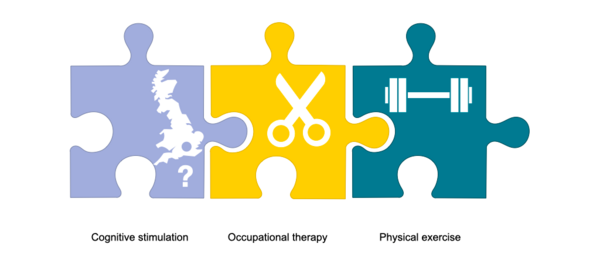Outline of dementia treatment
When and by whom should the treatment of dementia be initiated?
Immediately after the diagnosis has been established and disclosed to the person with dementia, long-term management of dementia should start by referring people with dementia and family and/or friends to relevant services. Ideally, the person with dementia should be provided with a single named health or social care professional who will be coordinating care. The coordinator should explore the person’s individual situation and their specific needs, inform them and their family about available services and how to access them, and identify and involve somebody as a carer to support and help the person in decision-making. The coordinator should suggest a care and support plan, in particular, a skillful coordination between different members of a multidisciplinary team. When an appropriate situation emerges, but relatively soon after confirming disclosure of the diagnosis, the coordinator should encourage the person who fully or partly retains the capacity to make decisions and to express their wishes through an advanced care plan.
Read more about the care plan in the CONNECT section “Planned and proactive management”.
What does the treatment of dementia involve?
The treatment of a person with dementia includes several approaches: pharmacological treatment, non-pharmacological interventions, and support of family and carers.

Pharmacological interventions
The pathological mechanisms of Alzheimer’s disease change the neurochemical processes in the brain, particularly the activity of substances that enable the communication between nerve cells (neurotransmitters). These changes include a decrease of the neurotransmitter acetylcholine and an increase of the neurotoxic effects of the neurotransmitter glutamate. Therefore, the most efficient medications that can be presently offered to people with dementia, particularly with dementia in Alzheimer’s disease, either reduce the breakdown of acetylcholine (cholinesterase inhibitors: donepezil, galantamine and rivastigmine), or partially block the activity of glutamate (memantine).
Cholinesterase inhibitors are also used for the treatment of dementia in Lewy body disease and may have positive effects in vascular dementia. In the treatment of frontotemporal dementia neither cholinesterase inhibitors or memantine showed any benefit. Although cholinesterase inhibitors provide modest therapeutic benefits these drugs are not a cure for dementia and do not alter the underlying disease process. They may have non-serious but unpleasant side effects.
Currently existing anti-dementia drugs (cholinesterase inhibitors, memantine) provide benefits but do not cure dementia.
New approaches for the treatment of cognitive impairments are currently being developed. Their mode of action is based on the removal of abnormally processed proteins (beta amyloid, tau) using synthetic antibodies. Several other substances have only doubtful effects in people with dementia (antioxidants, nootropics, extracts from the leaves of the Ginkgo biloba tree, ginseng, vitamin E supplements, or other herbal formulations).
When behavioural symptoms (e.g. agitation, hallucinations, aggressiveness) become disturbing or threatening for the person with dementia or people around them, other classes of drugs may be administered (e.g. atypical antipsychotics, antidepressants). With regard to the significant adverse events and risks associated with these compounds they must be judiciously used.
Medication for the treatment of behavioural problems have severe side effects and risks.
Expectations, risks and benefits of medications should be discussed with the person with dementia and their family. The choice of treatment should be based on several aspects, such as age, overall health, medical history, severity of the disease, the person’s previous lifestyle and their and family’s preferences. The medication of people with dementia should be reviewed periodically as certain frequently prescribed drugs can worsen the cognitive symptoms of dementia. Drugs for the treatment of behavioural problems should be administered at low doses and for short periods of time.
Non-pharmacological interventions
The currently available pharmacological interventions improve the symptoms of dementia only to a limited degree and contribute little to living well with dementia. In addition, many troublesome behaviours (apathy, aggressiveness, refusal of care, repetitive vocalizations, arguing) hardly respond to pharmacological treatments at all.
Therefore, non-pharmacological behavioural interventions should always be used to complement, or sometimes even replace, pharmacological treatment in order to enhance the quality of life of people with dementia and their carers. Specifically, cognitive stimulation, occupational therapy and physical exercise improve cognitive functioning, activities of daily living and behavioural symptoms. Several other types of non-pharmacological interventions have also positive effects, including reminiscence therapy, behavioural management, cognitive-behavioural therapy and music therapy. Non-pharmacological interventions are economical, have no side effects and can be delivered by professionals, allied workforce or even trained lay people.
Cognitive stimulation, occupational therapy and physical exercise are the most important non-pharmacological interventions.
The most important non-pharmacological interventions

Environmental modification and assistive technology
Other examples of a non-pharmacological interventions which can improve the quality of life of people with dementia and ease the burden of carers are modifications of the environment and assistive devices. These services can allow people with dementia to live in their own home for a longer time. Modifications of environment and assistive technologies include low-tech devices such as grab bars, handrails, lighting, colours, sign-posts, raised toilet seats, tub benches, pill organizers, identity necklaces or bracelets as well as high tech tools, (e.g. a voice-activated computer system, a hoist to lift and turn someone in bed, sensors, or smartphone appliances linked to a GPS (global positioning system) tracking system which can locate a person with dementia when they are lost.

Caregiver-centred interventions
Caring for a person with dementia puts an enormous burden on informal (family) caregivers and often leads to severe emotional and physical exhaustion as well as financial hardship. Education of carergivers and support from the community can relieve distress and prevent burnout. Local or regional Alzheimer’s Associations have an important role by providing counseling, training, education and support for caregivers. Another key resource are day care centres that offer daytime activity programmes for people with dementia.
References
- Birks J. Cholinesterase inhibitors for Alzheimer's disease. Cochrane Database Syst Rev CD005593, 2006
- Cammisuli DM, Danit S, Bosinelli F, Cipriani G. Non-pharmacological interventions for people with Alzheimer’s disease: A critical review of the scientific literature from the last ten years. Eur Geriatr Med 7: 57–64, 2016
- How CH, Koh LH. Not that way: Advance care planning. Singapore Med J 56: 19–22, 2015
- McShane R, Areosa Sastre A, Minakaran N. Memantine for dementia. Cochrane Database Syst Rev: CD003154, 2006

